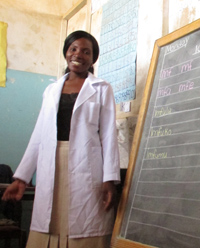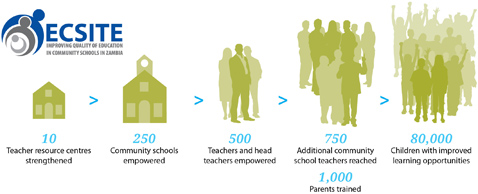From the outside, the school looks dull and uninspiring. Located in the outskirts of Ndola, it looks more like a storage shed than a school for 195 pupils. This is one of the 3,000 community schools dotted around poor areas of Zambia. Approximately 20 percent, or 600,000, of the students in the country‘s basic education system, attend community schools. These enrol the most economically disadvantaged children, who struggle with both psychosocial and learning issues.
One is not sure what to expect from this school until Dorcas appears. A young woman of 32, Dorcas proudly invites us to visit the place where she has been teaching for the last ten years. Her smile is warm and welcoming. Suddenly we are reassured that this is indeed a school. The classrooms are decorated with colourful geometric figures, a variety of weather conditions, the alphabet in small letters… all carefully drawn by hand.
 |
Dorcas Mwape is the teacher in charge at Chifubu UCZ Community School, Ndola periurban.
On career day one third of the class wears a white laboratory coat as they want to become teachers like me.
|
In Dorcas’ classroom all seats are taken. More than 30 pupils have their focus on copying unsolved calculations from the blackboard. At a closer look, we realize these are more than just sums. The grade 4 children are being taught money issues and all the figures on the board are followed by the symbol of the Zambian kwacha. Through this exercise the children are learning numeracy and the importance of calculating the correct change. This is something they can put into practice. It makes learning more interesting to them. Dorcas says she has learnt to make her lessons meaningful and interactive for the pupils as a result of the support from the ECSITE project.
All along she has been teaching without a teaching degree. In order to receive a secondary school certificate in Zambia, students have to pass six main subjects, called O Levels. This is something Dorcas has only managed to achieve this year. Thanks to the ECSITE project, funded by the European Union and implemented by VVOB, Dorcas was able to improve her grades in maths and science. After undergoing tuition over three sessions by certified lecturers, she sat for her exams in early October.
 |
Dorcas uses her bike to attend the upgrading courses, which are held in the evening.
This is the first time in my life I have a bike. When I’m riding it my legs are shaking.
|
Dorcas is one of 120 teachers who have been supported to upgrade their O Levels through funding from the European Union. This will allow people like Dorcas, who have a passion to teach, to access the Teacher Education Colleges and realize their dream to become fully recognised teachers. Like most of her colleagues serving in community schools, without regular income, Dorcas was unable to invest in tuition and examination fees to do this on her own. She lost her father when she was only ten years old. Her mother struggled to put her and her siblings through school. Funds towards her O Levels were not an option. Looking after her mother has become her responsibility now.Talking about what else has changed in her teachings as a result of the ECSITE project, Dorcas says: “I did not know that involving parents could have such a positive impact on the children’s learning process. If parents keep their children too busy after class, they are not able to do their homework or they come for class tired the following day. I have started discussing with parents possible solutions to bad grades. Before I didn’t do this. I also believe the children are happier to learn and come to school.”
 |
The children like to come to the front to use the blackboard to read or write.
When I was 9, I imagined I was the teacher and played with the younger kids as if they were my pupils. I even made a small board. |
This is a direct result of the pedagogical skills training that was offered to 250 untrained teachers, in addition to the O Levels, to support them in didactics and methodological skills. The project also organised workshops for parent school committees at the schools though which they were provided with information on how to set up income generating activities for the schools, how to keep girls in schools and how to seek government support for community schools.
When Dorcas speaks about teaching you see a twinkle in her eyes. Her whole face lights up. Her body language reveals her passion for what she does. She tells us that her dream started when she was nine. Already then, she would improvise a board and make the younger kids of the neighbourhood sit around her as she “taught”. She used charcoal to write on the board and it was clear already then that she wanted to become a teacher. Today her biggest satisfaction is to improve the life of her students by imparting knowledge.

- The ECSITE project is co-financed by the EU, with the aim of improving the teaching skills of untrained community school teachers in Central and Copperbelt Provinces in Zambia. The project runs from 2013 till 2015.
- Zambia has 3,000 community schools. They receive little or no funding from the Ministry of Education. The community schools are usually staffed by untrained teachers. They are very committed, as they work without pay, but they lack the minimum requirements to become teachers and thus are not trained as teachers. 600,000 children in Zambia are learning from community schools. These children live in areas that are not adequately served by government schools.
- ECSITE supports 750 community schools with teaching and learning tools. Teachers from 250 schools are provided additional training to improve their teaching, and parents are trained on how to improve the management of the schools. This effort is expected to improve the education of more than 80,000 vulnerable boys and girls across Zambia.




